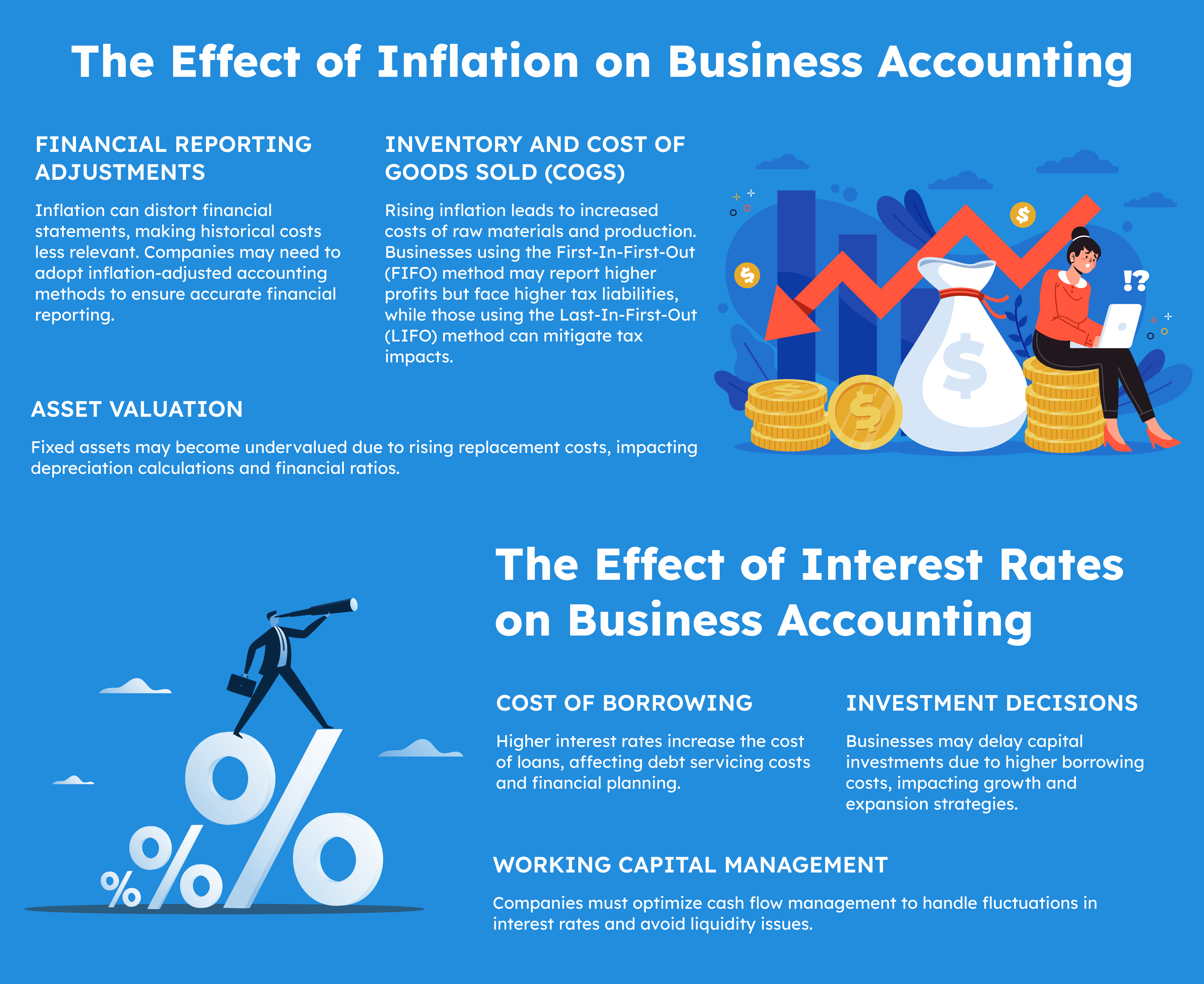In today’s ever-changing economic landscape, inflation and interest rates play a crucial role in shaping business accounting strategies. Companies must adapt to these macroeconomic factors to maintain financial stability, ensure profitability, and comply with regulatory standards. This blog explores how inflation and interest rates affect business accounting, backed by analytics, statistics, and key insights.
Understanding Inflation and Interest Rates
Inflation refers to the general increase in prices over time, reducing the purchasing power of money. Interest rates, determined by central banks, influence borrowing costs and investment decisions. Both factors significantly impact financial reporting, asset valuation, and cash flow management.


The Effect of Inflation on Business Accounting

Financial Reporting Adjustments
Inflation can distort financial statements, making historical costs less relevant. Companies may need to adopt inflation-adjusted accounting methods to ensure accurate financial reporting.

Inventory and Cost of Goods Sold (COGS)
Rising inflation leads to increased costs of raw materials and production. Businesses using the First-In-First-Out (FIFO) method may report higher profits but face higher tax liabilities, while those using the Last-In-First-Out (LIFO) method can mitigate tax impacts.

Asset Valuation
Fixed assets may become undervalued due to rising replacement costs, impacting depreciation calculations and financial ratios.
The Effect of Interest Rates on Business Accounting

Cost of Borrowing
Higher interest rates increase the cost of loans, affecting debt servicing costs and financial planning.

Investment Decisions
Businesses may delay capital investments due to higher borrowing costs, impacting growth and expansion strategies.
Working Capital Management
Companies must optimize cash flow management to handle fluctuations in interest rates and avoid liquidity issues.
Analytics and Statistics on Inflation and Interest Rates
According to the International Monetary Fund (IMF), global inflation rates averaged 6.8% in 2023, affecting financial strategies worldwide.
The Federal Reserve raised interest rates 11 times from 2022 to 2023, increasing the cost of corporate borrowing.
A survey by Deloitte found that 72% of CFOs are adjusting their accounting models to mitigate inflationary pressures.
Key Benefits of Proactive Accounting Strategies
Accurate Financial Planning
Implementing inflation-adjusted accounting ensures realistic financial projections.
Improved Risk Management
Businesses can mitigate financial risks by adapting to interest rate fluctuations.
Enhanced Profitability
Strategic pricing and cost management help maintain profit margins in inflationary environments.

Conclusion
Inflation and interest rates are critical factors that influence business accounting decisions. Companies that proactively adjust their accounting strategies can navigate economic uncertainties more effectively. Xerosoft Global provides innovative accounting solutions to help businesses manage financial complexities in changing economic conditions. By leveraging the right accounting tools, businesses can enhance financial accuracy, optimize decision-making, and sustain long-term growth.
Resources
- INAA Group. The Impact of Inflation on Accounting Firms
- Investopedia. What Is the Relationship Between Inflation and Interest Rates?
- Anders CPA. Rising Interest Rates and Inflation May be Lowering Your Company’s Value – Here’s How to Take Action
- Wolters Kluwer. Inflation and accounting procedures can reduce the accuracy of financial analysis

